JANUARY 21, 2013 — “As far as I can tell, there are only THREE roads that lead to the top, and we’ve tried all of them,” I say to my brother Brian, as he attempts to weave our rental car through the narrow streets of Lisbon’s Alfama neighborhood, chauffeuring me and my mom in Portugal. “I don’t think it’s possible to get to the palace!” We’re trying to drive to our hotel, the exquisite Palacio Belmonte, which sits on the top of a hill above the city — but, parked cars blocking roads, “ACESSO RESTRITO” signs, and large steel pylons seem to greet us at every possible turn.
“There’s nowhere to go!” my brother exclaims as he drives around a car parked literally in the middle of the street. “And, what is going on with the parking rules in this country?! Are people allowed to just park wherever they want?”
We’re just one hour into our grand, self-planned, Portugal family road trip, and I’m afraid that it’s already a bust. Maybe, I think, this road trip was ill-conceived from the beginning. I’ve slowly become a kind-of de facto travel agent for my family and friends, a phenomenon that any tech-worker or doctor will tell you is like being Hugh Grant: it’s nice to be needed, but sometimes you wish it weren’t in the same role you’ve played 100 times before. For this trip, my family gave me two requirements for a Christmas road trip: my mom wanted to go somewhere warmer than Ohio in the winter, and my brother didn’t want to fly more than eight hours away from New York. I eliminated North Africa (because I spent nine weeks there last year), making the best remaining winter options Portugal and Greece. Since my mom had already been to Greece, we all agreed upon Portugal, but we didn’t take into account the difficulty of driving Lisbon’s Alfama when we made the decision.
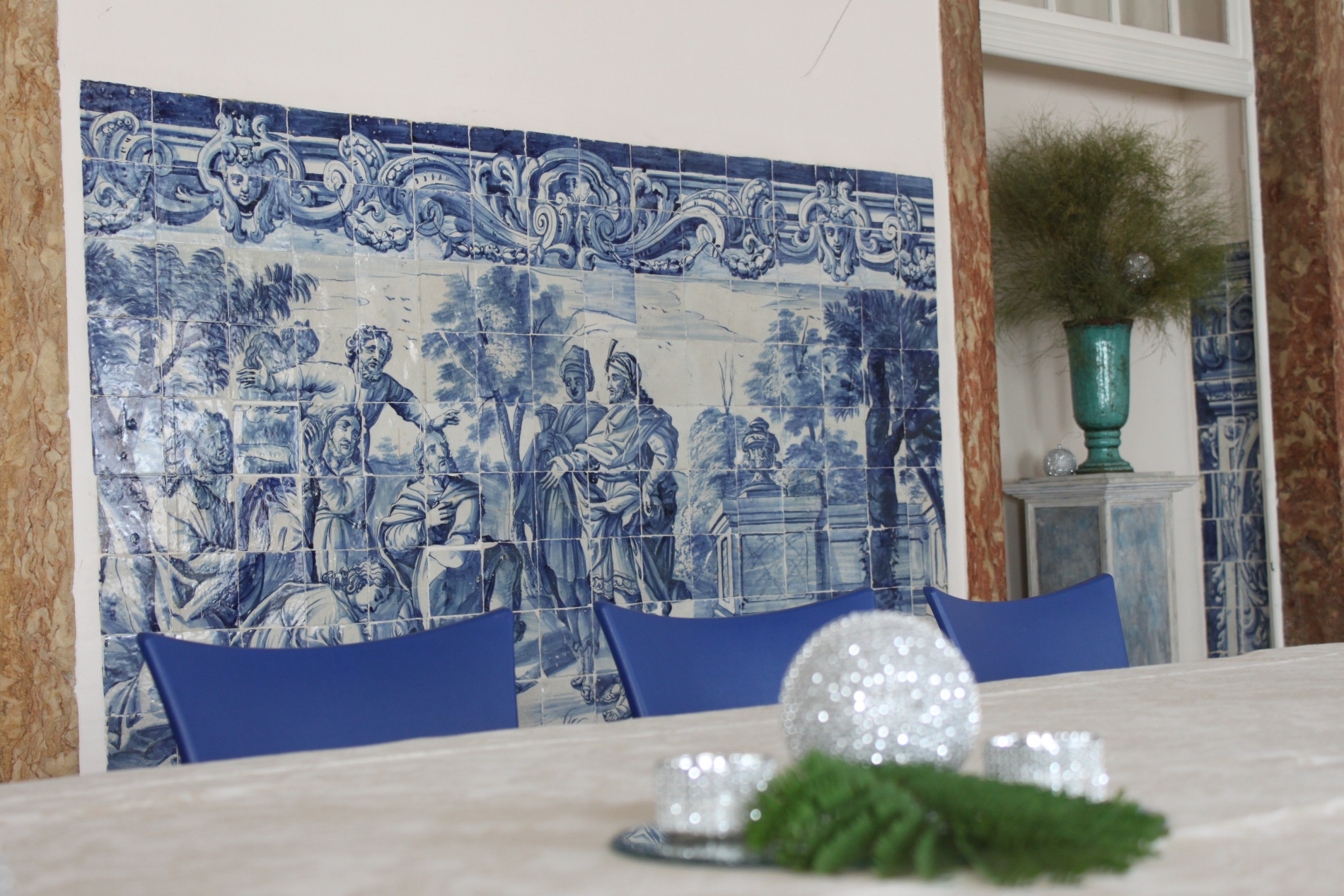
Azulejos cover the walls in Lisbon’s exquisite Palacio Belmonte hotel.
Exasperated, Brian doesn’t know what to do, so he steps on the accelerator and drives the car directly toward the steel pylon blocking the road. To all of our amazement, the pylon disappears, seemingly magically, into the pavement.
“In all my travels, I’ve never seen a pylon disappear by itself like that,” I say, as Brian drives through a narrow, red gate into a courtyard in front of the hotel.
“This is not a hotel — it’s a guest palace,” explains Maria, the dark-haired, middle-aged, attractive manager of the Palacio Belmonte, as she leads us to our suite through a perplexing maze of stately rooms and ornate doors. “My family, with 17 children, will be having a Christmas Eve dinner here if you’d like to join us.” She glances at a strange, half-constructed, abstract Christmas tree, made from wire and pages from a fashion magazine. “Sorry, we’re not quite done with the tree.”
“Wow,” my brother says as we pass through a long dining room fit for a king, furnished with a 20-foot-long table, ornate candle chandeliers, and walls adorned by swaths of azulejos, intricately painted, ceramic Portuguese tiles. The pastoral scenes made from tiles decorated with blue paint are so rich and detailed that we spend a half hour exploring the palace’s rooms, admiring and photographing the wall murals.
After settling in and methodically trying to memorize the complicated escape route from our suite — we realize that if we’ve reached the medieval bathtub room, we’ve gone too far — my mom, Brian, and I wander the snaking cobblestone streets of Lisbon’s Alfama, stopping for traditional Portuguese salted cod and what turns out to be the world’s best fried potato skins at Santo António de Alfama restaurant. With full stomachs, we continue exploring and pass another abstract Christmas tree: this one, a palm with a pyramid of lights built around its base. It occurs to me that there must be no pine trees in Portugal.
As we continue down the hill, our street dead-ends into the Museum of Fado, Portugal’s traditional guitar music. We walk inside and find ourselves listening to renowned Fado musician José Pracana, explaining in a video that Fado, music characterized by melancholy vocals and melodies, is about vigor, not rigor (“O fado não tem que ter rigor, tem que ter vigor!“). In one room, we’re so tired from jet lag that we collapse on the floor, in front of a looping video of performances of renowned Fado singers Carlos do Carmo and Amalia Rodrigues. Maybe it’s because we’re so exhausted, but, we’re mesmerized, and we become instant Fado fans.
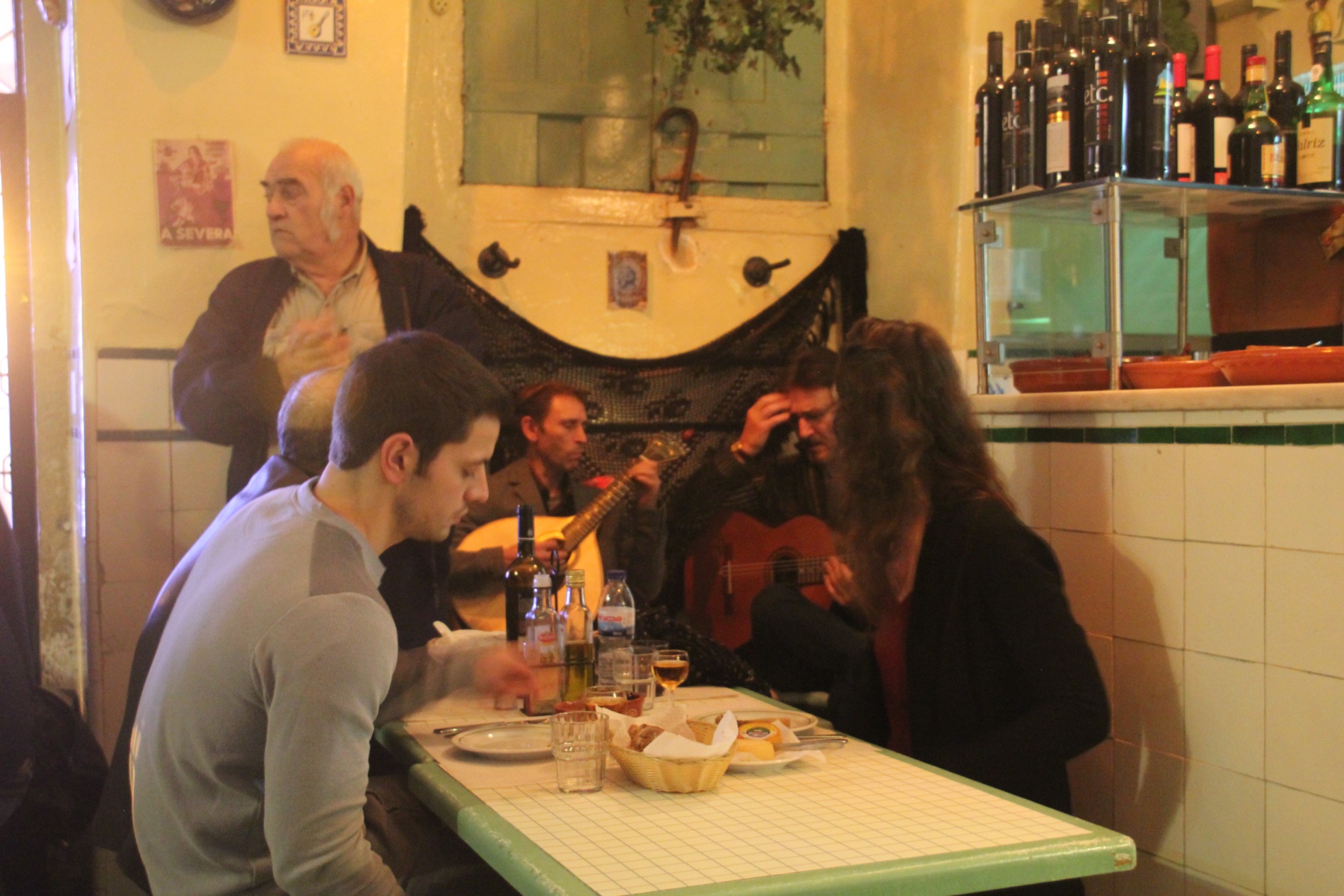
Fado musicians perform in the A Baiuca restaurant in Lisbon’s Alfama.
Afterward, we decide to eat dinner at A Baiuca, a small Alfama seafood restaurant known for its mid-dinner Fado performances. While we eat, a group of wine-drinking regulars, backed by two guitarists sitting on a bench in the corner, takes turns singing Fado songs. First, two men perform: a middle-aged, tired-looking Carlos do Carmo look-alike, and a shorter, younger man in a tweed jacket. Though I can’t understand the Portuguese song lyrics, I’m pretty sure the men are listing their life regrets. Then, a man who looks like he’s been drunk for the past twenty years (with most of his teeth missing to prove it) performs, with vocals far worse than those of the first two acts, but with a passion far surpassing everyone we’ve seen thus far — which, we now know from our museum visit, is the point of Fado. Later, to our amazement, one of the restaurant’s cooks, wearing a hairnet and a smock, wanders out from the kitchen and sings an impressive number. But, our favorite singer is a graying man in his sixties whose voice is so beautiful and melancholy that I can’t help but wonder how his wife deals with becoming depressed and forlorn every morning after hearing his perfect voice from the shower.
On Christmas Eve, after managing to escape our “guest palace’s” medieval bathtub room (somehow, we always end up there when trying to navigate our way out of the maze), we decide to drive to Sintra, a small, nearby town known for its 19th-century Romantic palaces and mist-enveloped forests, to visit Pena National Palace, which sits on a peak above the town. On the way out of Lisbon, after driving through another magically disappearing pylon, we encounter another man who has parked his car squarely in the middle of the road. When my brother honks the horn, the man gestures unhelpfully, giving the impression that he doesn’t believe that he’s doing anything wrong.
By now, we’re all starting to understand the subtleties of Portuguese culture.
“Oh, no problem! We can squeeze by!” my brother says as he drives around the man. “It’s about vigor, not rigor!”
“Our trip runs on passion! The passion of Fado!” I yell, and, soon, we’re speeding down the highway toward Sintra.
A royal Christmas miracle
Celebrating Christmas Eve at four Portuguese castles — and a gas station.
JANUARY 24, 2013 — My mom, brother, and I are driving a narrow, winding mountain road in the UNESCO World Heritage town Sintra, toward the Romanticist Pena National Palace, when a frantic Chinese man approaches our car, with his wife, daughter, and another Chinese couple behind him.
“Hello! You have any gasoline in a bottle?!” he yells.
“Sorry, it’s a rental car,” my mom replies. “We don’t have a gas can, and our car runs on diesel.”
“Really, our car runs on passion,” Brian mumbles, “the passion of Fado.”
The Chinese man looks back at his family, looking sheepish.
“We should probably help him,” Brian says, though we’re rushing to see Sintra’s castles because they’re all closing early for Christmas Eve.
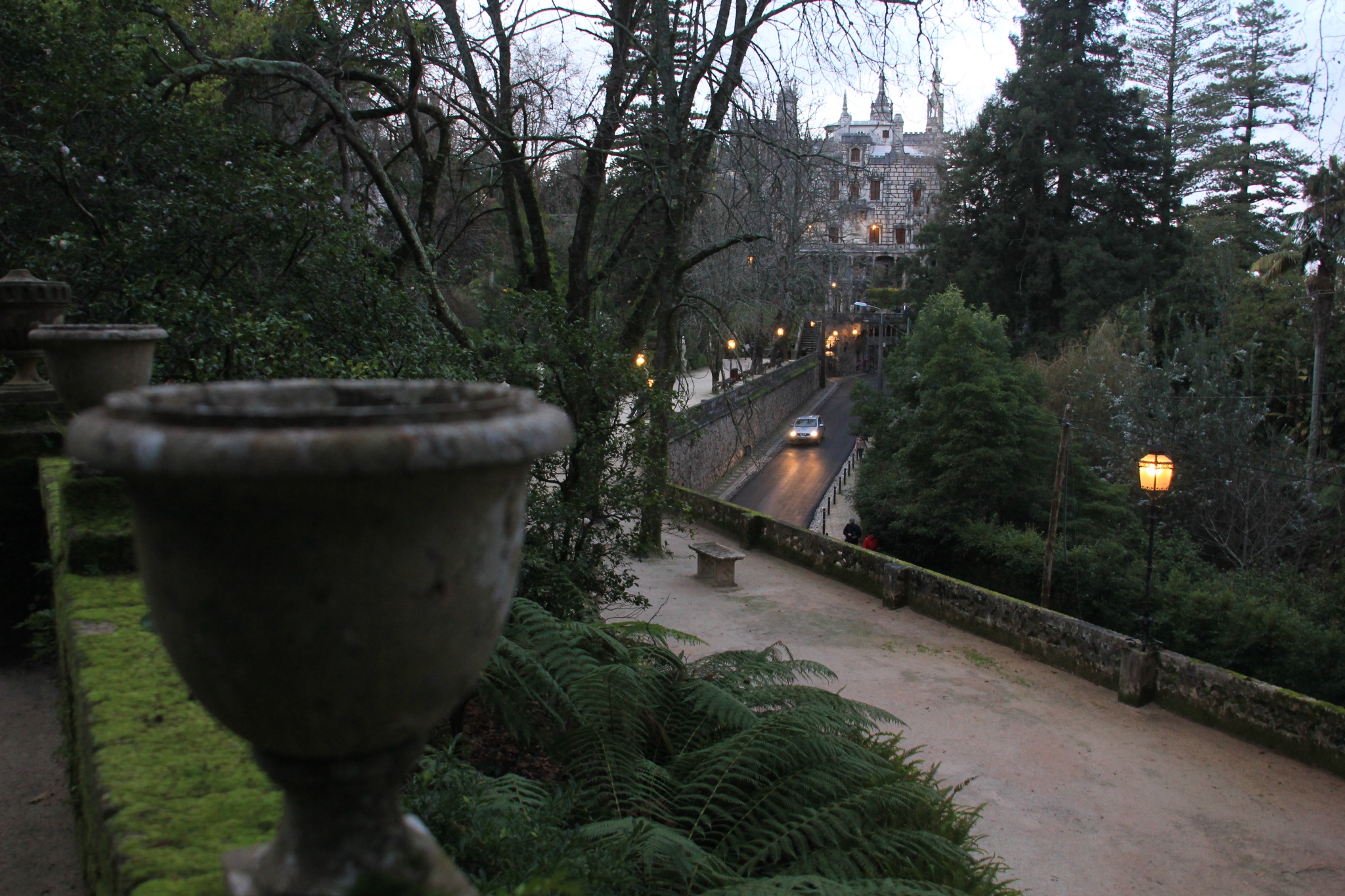
The palace at the Quinta da Regaleira estate looms over its surrounding, lavish gardens in Sintra, Portugal.
“Maybe there’s a gas station nearby,” I say, doing a search on my iPhone’s Google Maps.
“Get in!” my brother says to the Chinese man. He joins my mom in the backseat and introduces himself to us as Quon.
“Car gas gauge works opposite,” Quon explains. “The whole week I thought full. Thank you! Thank you!” It occurs to me that this explanation makes no sense, but, nevertheless, Brian redirects our car toward the least scenic destination in all of fairy-tale Sintra: its gas station. After Quon buys a can and fills it with gas, he puts it into our hatchback.
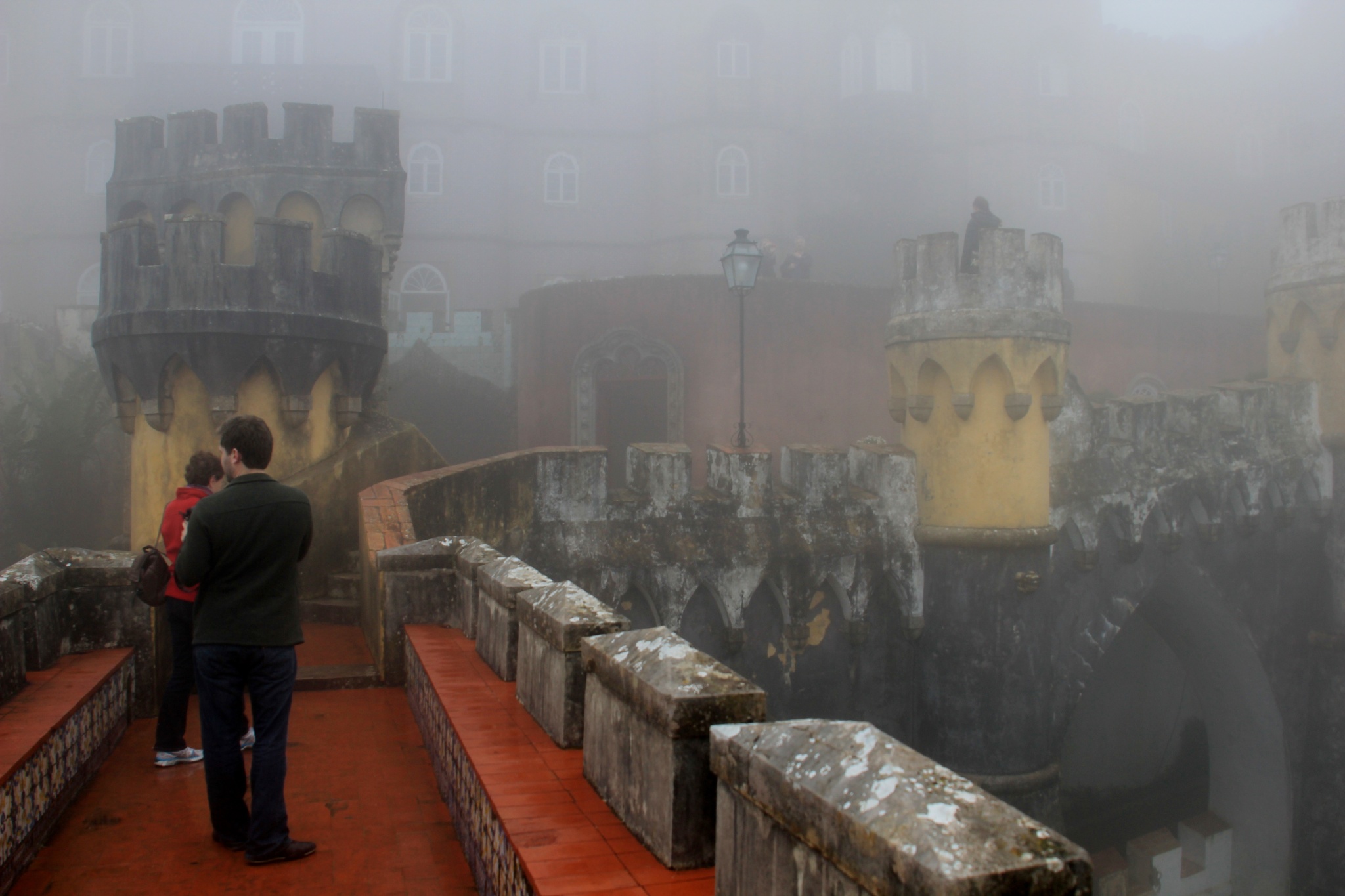
Tourists visit a fog-enveloped Pena National Palace in Sintra, Portugal.
“It really smells like gas in here,” my mom says as we begin driving back up the steep hill toward the Palace.
“Yes, well, there’s a gas can in the trunk,” I say, as Brian accelerates into a tight curve. We hear the gas can tip over.
“Wow, now it really smells like gas,” Brian says. He stops the car. Quon jumps out anxiously and opens the hatchback to investigate.
“It’s miracle,” Quon says. “Gas can tip over on camera, but lid safe.” Quon hands me my camera. “Camera safer in its box.” Relieved that our trip to Sintra has not ended with the three of us drowning in gasoline in our rental car, we continue up the road. When finally we reunite Quon with his car and family, they’re ecstatic.
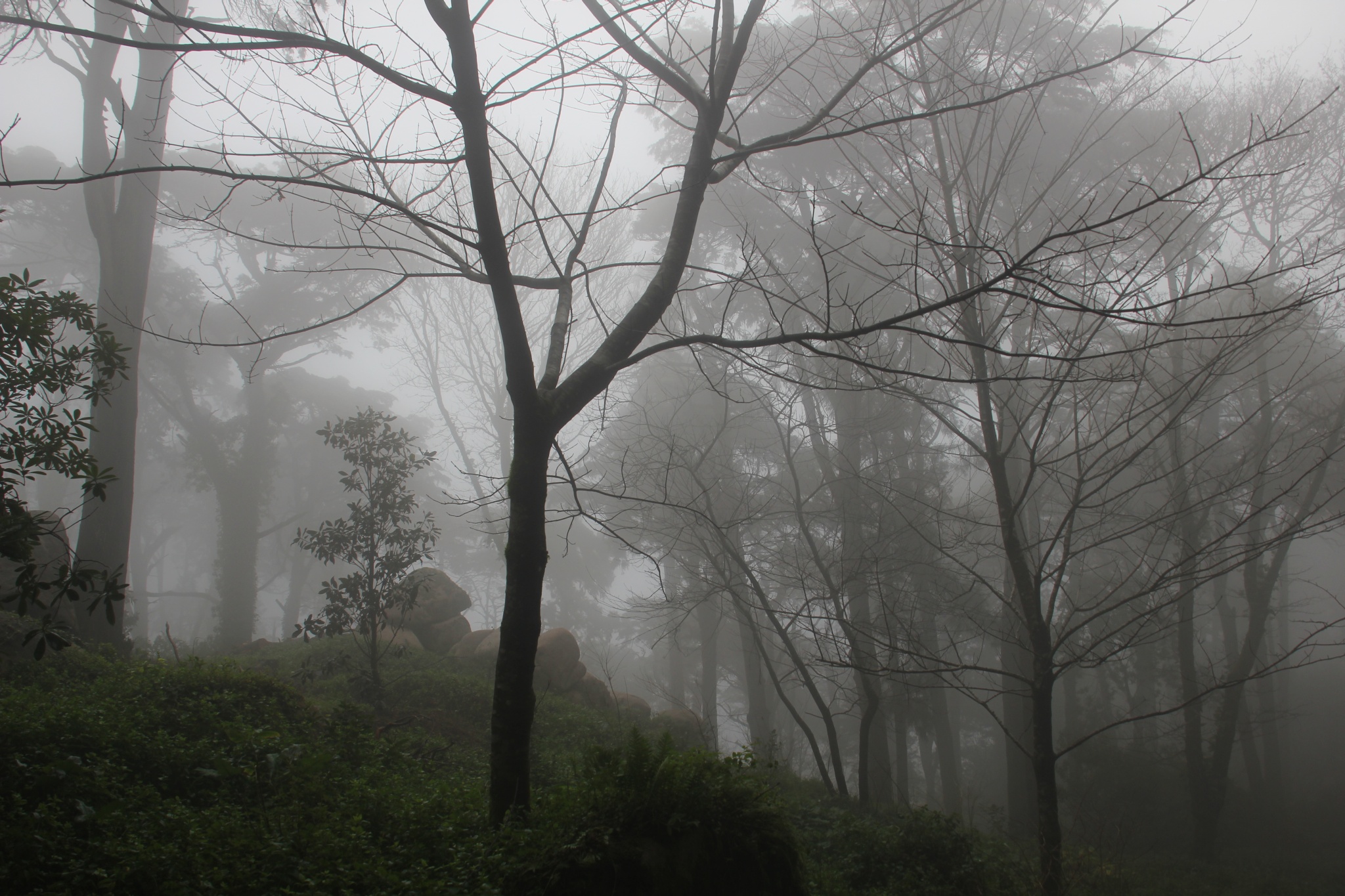
Sintra’s Pena National Palace sits in the middle of a 500-acre park, filled with trees from around the world and a labyrinth of walking trails.
“We must, must pay you,” Quon says.
“No, just do something nice for someone else,” my mom says.
“It’s Chinese tradition to give gift,” Quon’s wife insists. She runs to her family’s car and returns with a small shopping bag containing a wrapped gift. “A Christmas gift from Portugal,” she says eagerly as she hands it to me through the passenger-side window. “We bought it today.”
“Thank you so much,” I say. “It was great meeting all of you!”
“Thank you! Thank you!” Quon says. He and his family stand in front of their car, thanking us profusely and continuously. “Thank you! Thank you!” Quon’s wife says. “Thank you! Thank you!” Quon’s daughter says. “Thank you! Thank you!” Quon’s wife’s friend says. “Thank you! Thank you!” Quon’s wife’s friend’s husband says.
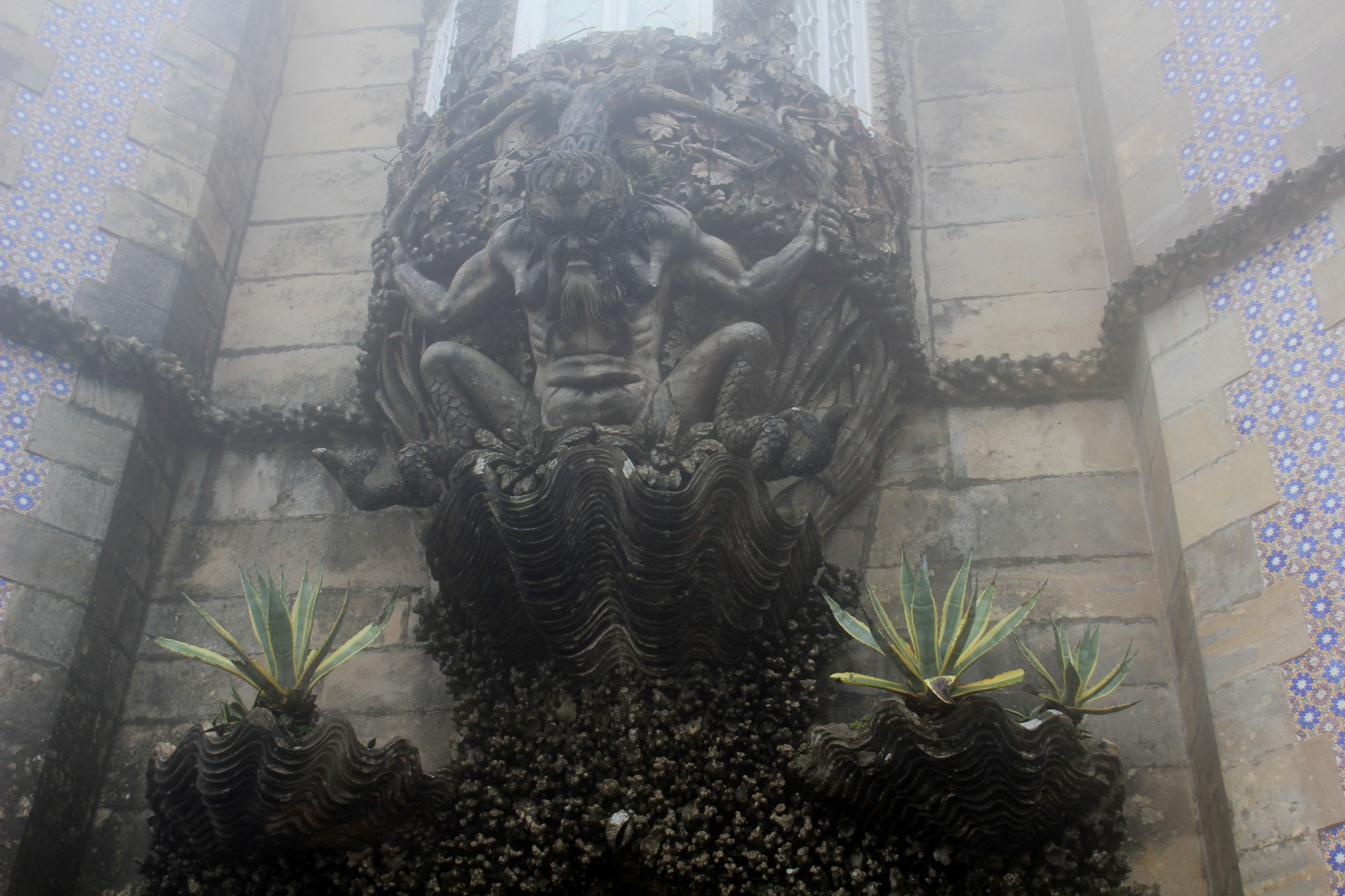
A triton emerges from a clamshell above a gate in the Pena National Palace in Sintra, Portugal.
“You’re welcome! Merry Christmas!” I say.
“Merry Christmas! Thank you! Thank you!” Quon says. There seems to be no stopping them, so Brian simply starts driving away. When we look back, we can see them still thanking us and waving. It occurs to me that a small sightseeing delay for us has become a Christmas miracle for the Chinese families. When I open Quon’s wife’s package, I discover a ceramic azulejo, just like the ones decorating the walls of our hotel. The beautiful, blue tiles seem to be shepherding us through Portugal.
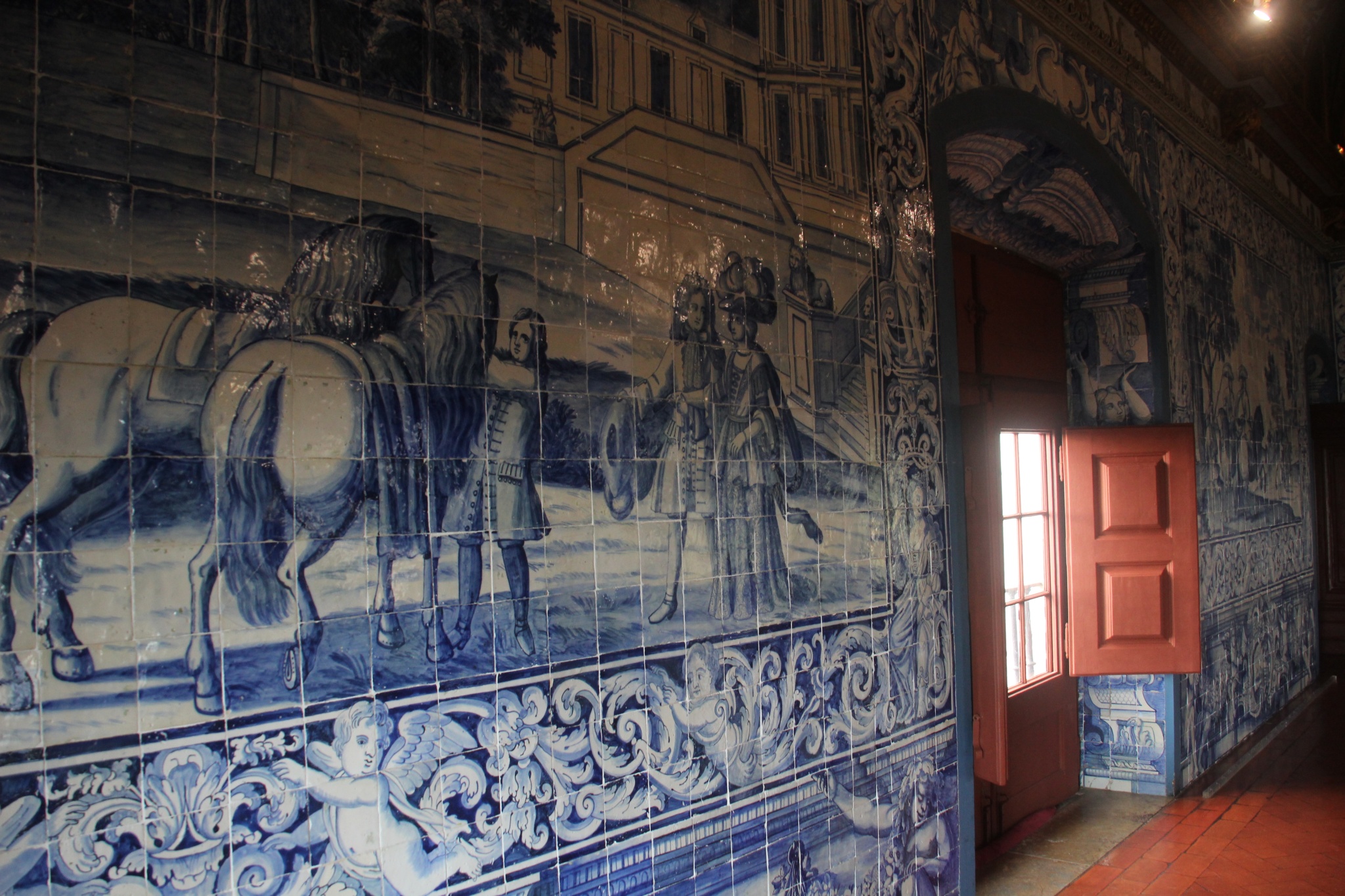
Azulejos adorn the walls of Portugal’s Sintra National Palace.
When, finally, we arrive at the Pena Palace at the top of a mountain above Sintra, we find ourselves in the middle of a 500-acre park, filled with trees from around the world and a labyrinth of walking trails. The hilltop is covered in a dense fog, and I feel like we’re floating through a surreal cloud world as we walk past the Palace’s yellow, medieval castle turrets and under a large, stone triton (a half-man, half-fish statue) emerging from a clamshell. In the castle’s courtyard, we discover another abstract Christmas tree to add to our Portugal-has-no-real-pine-trees photo collection: a stone spike adorned with wooden balls attached to metal branches. Next, we take a tour of the Sintra National Palace, admiring its distinctive spiral staircase, a ceiling painted with the coats-of-arms of Portuguese noble families, and rooms decorated with Arabian motifs. Afterward, we head toward Quinta da Regaleira, a castle surrounded by another famously dreamlike garden estate, but, we’re disappointed to discover that the gates are already locked.
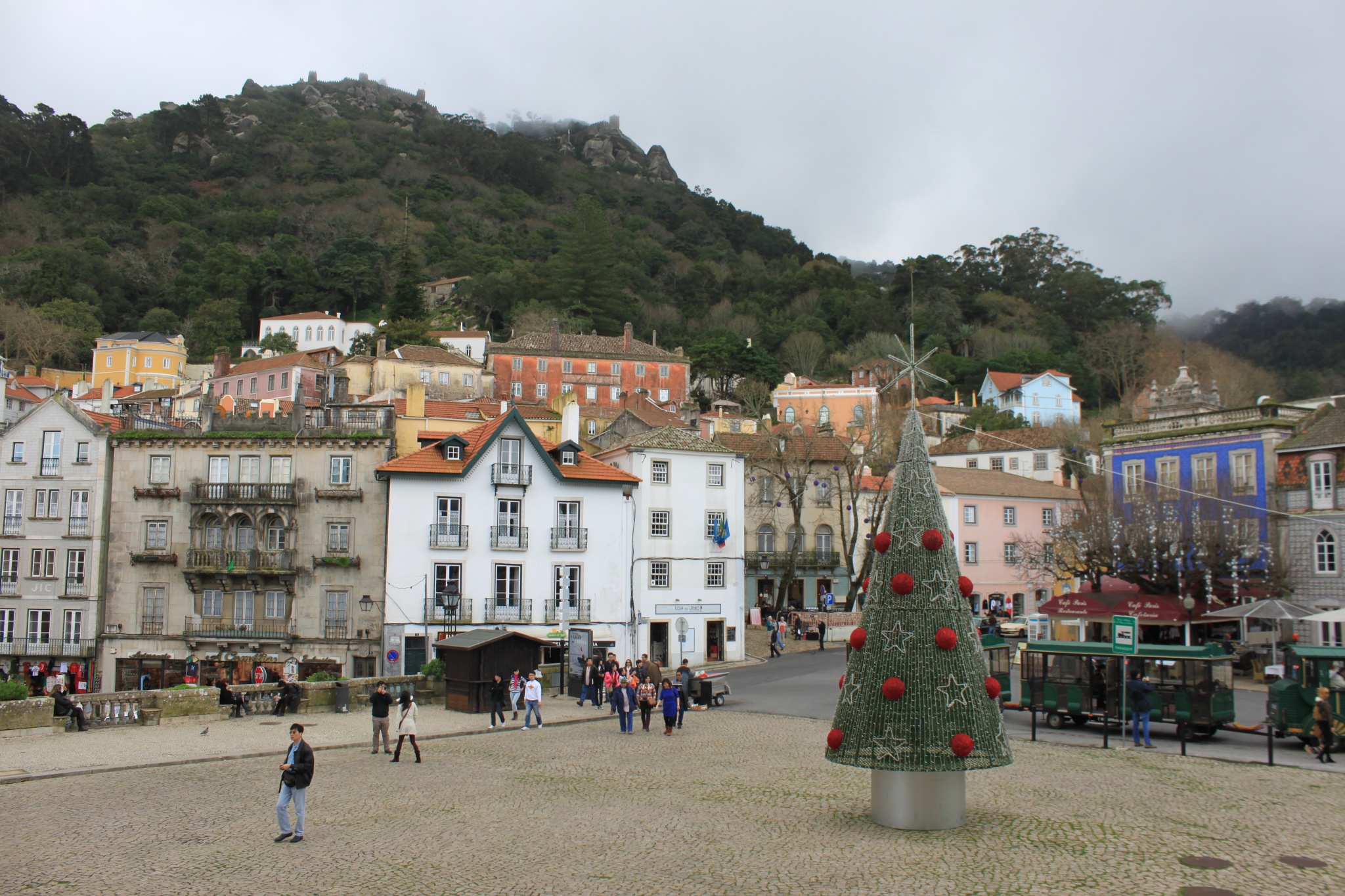
The Pena National Palace sits on a hill above the Sintra town square, featuring a steel, abstract Christmas tree.
“Well, I think it was worth it to deliver a Christmas miracle,” my mom says.
When we return to the Palacio Belmonte in Lisbon, we don our best clothes to meet hotel manager Maria and her family for Christmas Eve dinner. We walk into the dining room expecting a stuffy, formal dinner party, but we’re greeted instead by chaos: kids are playing kickball in the azulejo-adorned rooms, adults are chasing kids through the maze of the palace, and dinner is far from ready to eat. For a dinner party in a fifteenth century palace, the family chaos feels surprisingly similar to my childhood, suburban Christmases in the American Midwest.
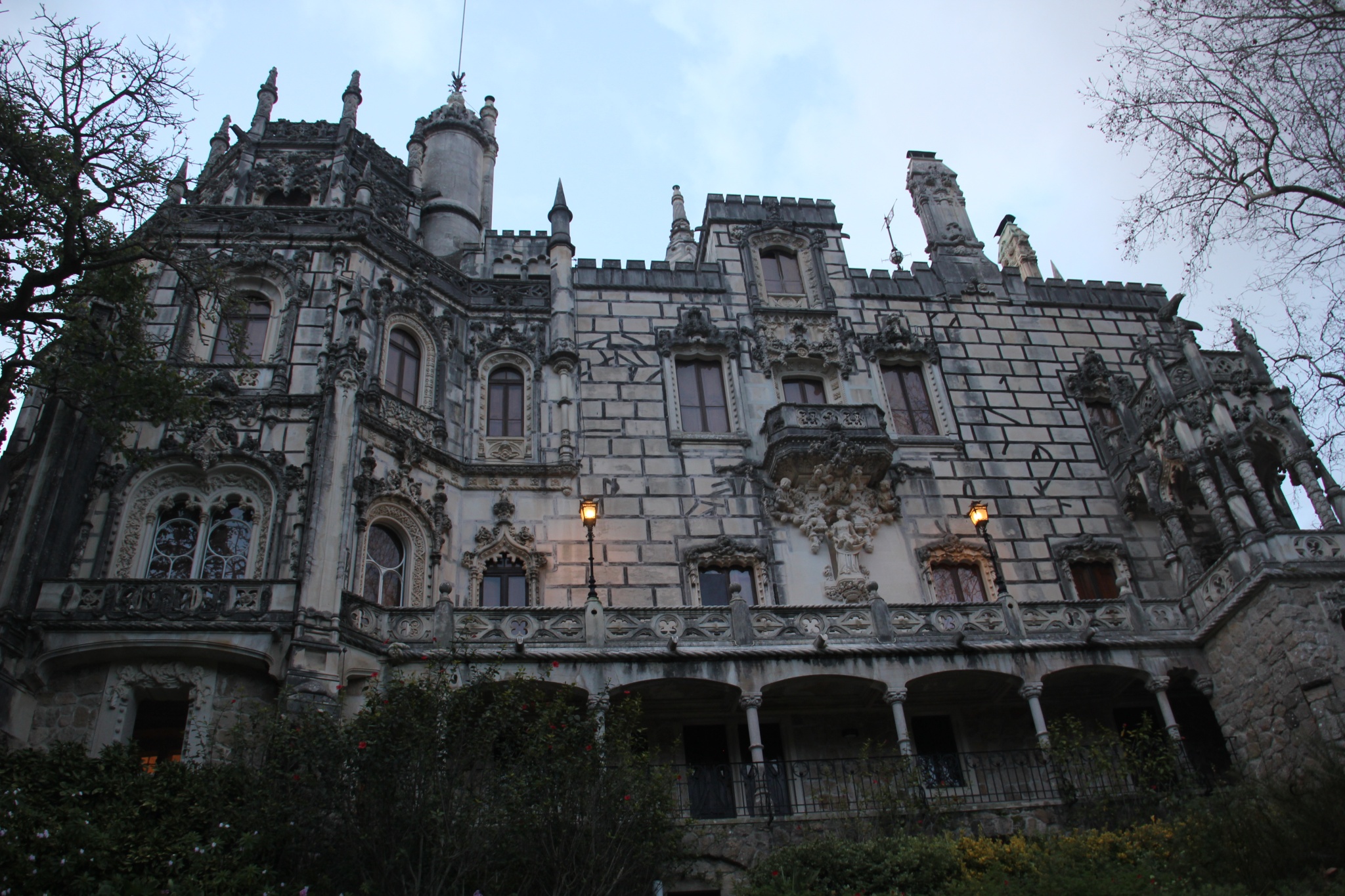
The palace at the Quinta da Regaleira estate is imposing.
“We used to make the kids wait to open their gifts until the adults finally finished their dinner at around 2 AM, but the kids would lose their minds,” Maria’s cousin tells us as we get ready to eat. “This year, we’ve decided to try having Father Christmas deliver the gifts before dinner so that they can play with their toys while the adults eat.” Just as she says this, Santa Claus appears in the next room and doles out a large sack of gifts to the rabid gaggle of children. Quickly, the toys pacify the children, and the rest of us sit around the palace’s enormous dinner table, surrounded by azulejos next to the Christmas tree made from fashion magazines.
Maria was right. We don’t feel at all like we’re at a hotel. We feel like we’re the Christmas Eve guests of an eccentric Portuguese king, one with a penchant for ceramic blue tiles, abstract Christmas trees, and delivering children’s Christmas miracles.
Hurry, turn left at the fountain!
Getting lost in Portugal’s Duoro Valley, the birthplace of port wine.
FEBRUARY 9, 2013 — Lines to the cash register snake out of the door at the famous Antiga Confeitaria de Belém pastry shop in Lisbon as my mom, my brother Brian, and I stand amongst the chaos of hundreds of people clamoring to buy a Pastéis de Belém, Portugal’s traditional egg tart. A Portuguese man sees that we look utterly baffled and, taking pity on us, instructs us where to stand. When I reach the front of one of the lines, I realize that we’ve been standing in a line that will allow us to buy tarts but not one that will let us sit at a table. But, since so many people are trying to get to the register, I quickly pay for three egg tarts and we rush outside.
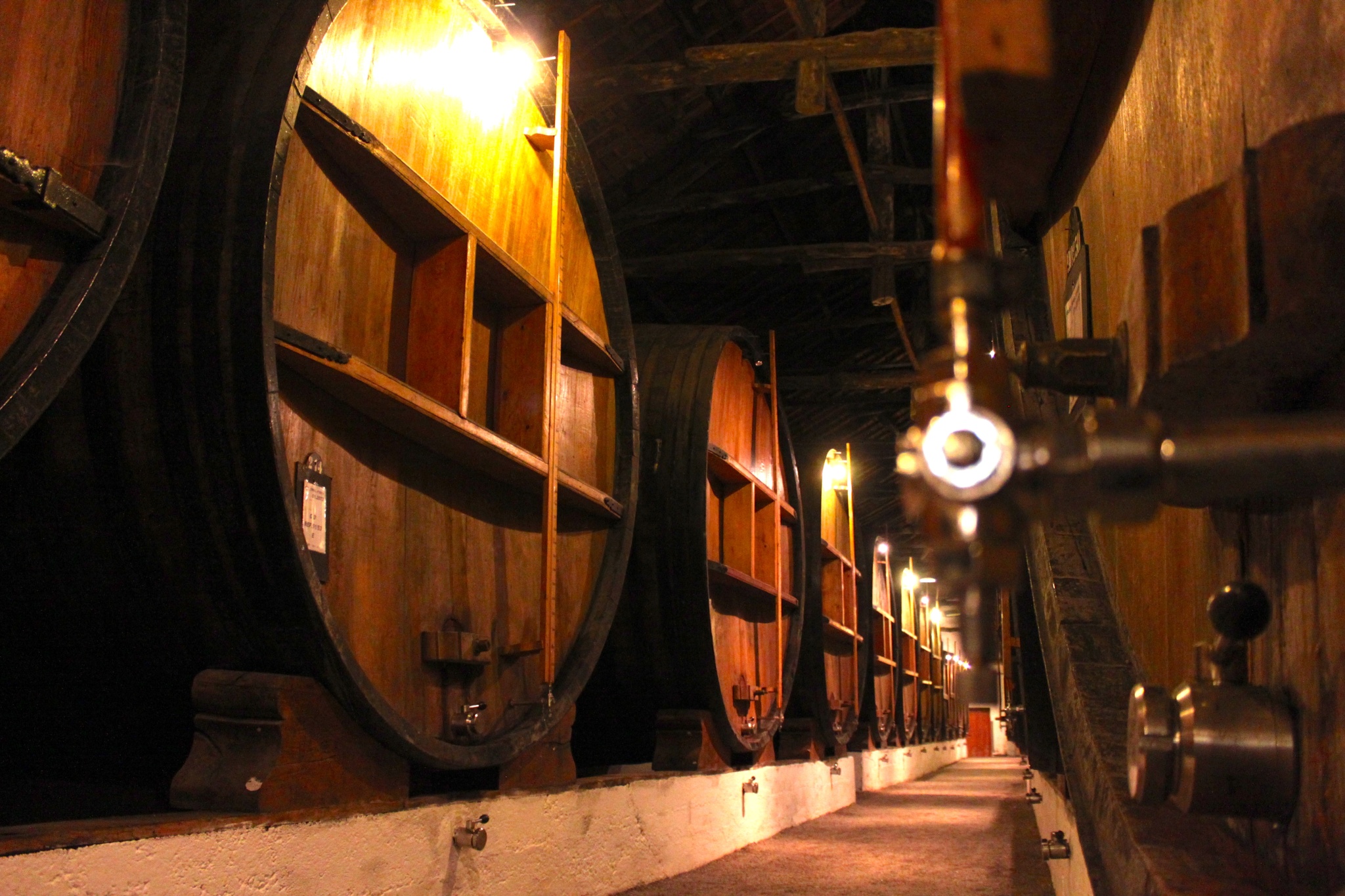
Wine ages in wooden barrels at Taylor’s Port Wine in Porto, Portugal.
“Here, eat these!” I say as the three of us huddle together on the sidewalk. The tarts taste good, but before we can get a chance to savor them, they’re gone, and we’ve jumped back into the car.
Though we’ve been planning to visit the Algarve, Portugal’s southern coast, Brian suggests instead that we drive to Porto. He’s read about the city in a guidebook, and he wants to taste Porto’s internationally famous export, port wine and see the city’s wine caves, where wine ages and waits for shipment. We have to make some hotel reservation changes, but we decide that half the fun of a road trip is changing the route on-the-fly. So, we speed off in a new direction, toward northern Portugal, stopping on the way to see the famous round church in Tomar’s Castle and Convent of the Order of Christ, the enormous kitchen at the gothic Monastery of Alcobaça, and the narrow, cobblestone streets and Christmas market in medieval Óbidos.
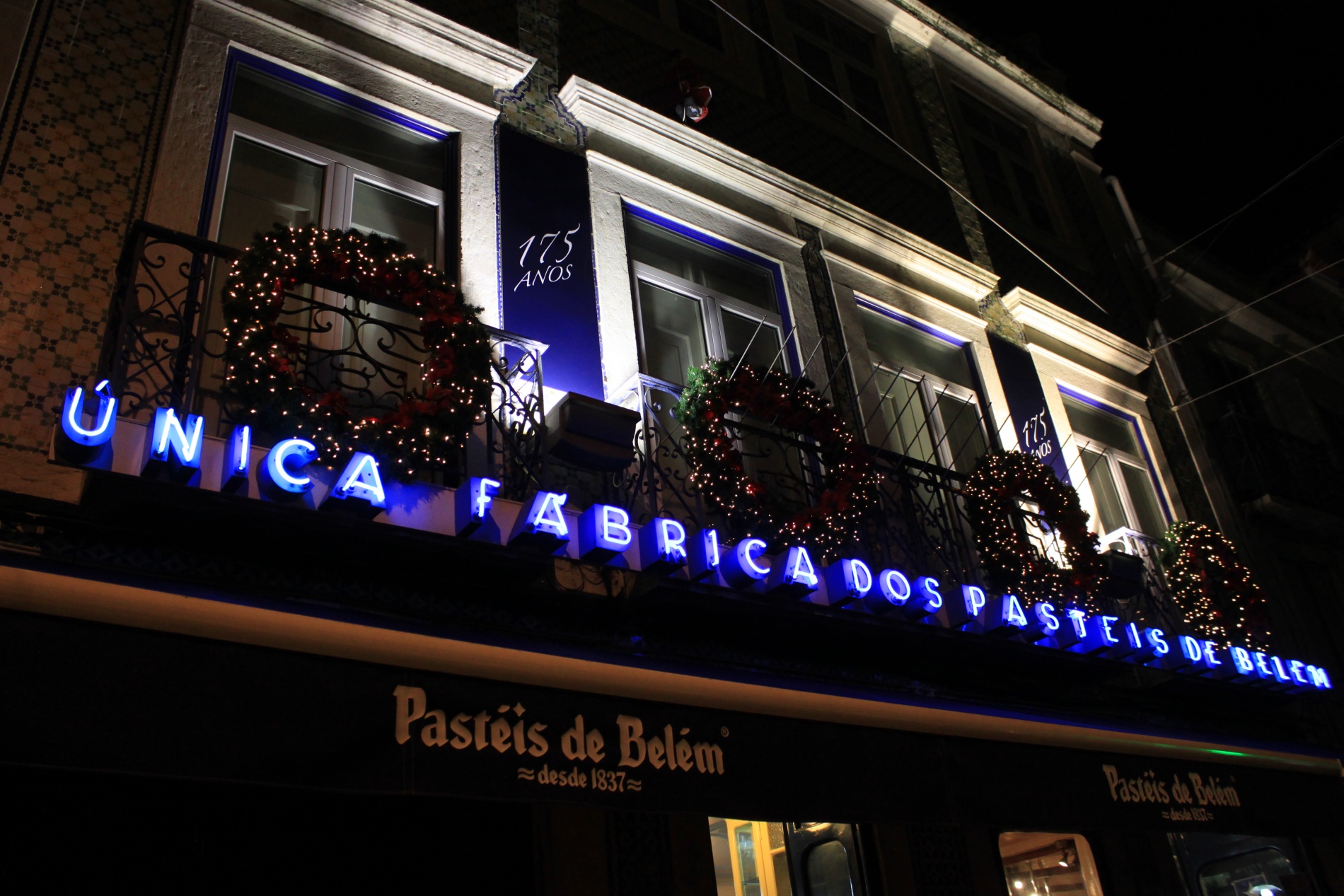
Pastéis de Belém is sold at the famous Antiga Confeitaria de Belém.
When we finally arrive in Porto, we take a walking tour of the city: we admire the dazzling azulejos in the São Bento train station, the beautiful, towering Igreja de São Francisco, the Roman ruins in the Casa do Infante, and the Eiffel-inspired Ponte de Dom Luís I, which links Porto to the suburb of Gaia over the Duoro River. In Gaia, a charming, British woman gives us a tour of dark, musty warehouses containing barrels of aging wines at Taylor’s Port Wine, one of Porto’s oldest founding Port houses and the only remaining one that is family-owned. We’re pleasantly surprised by the three port wines we’re given to taste, and I leave with less of an aversion to the often-cloying sweetness of port wine less than before.
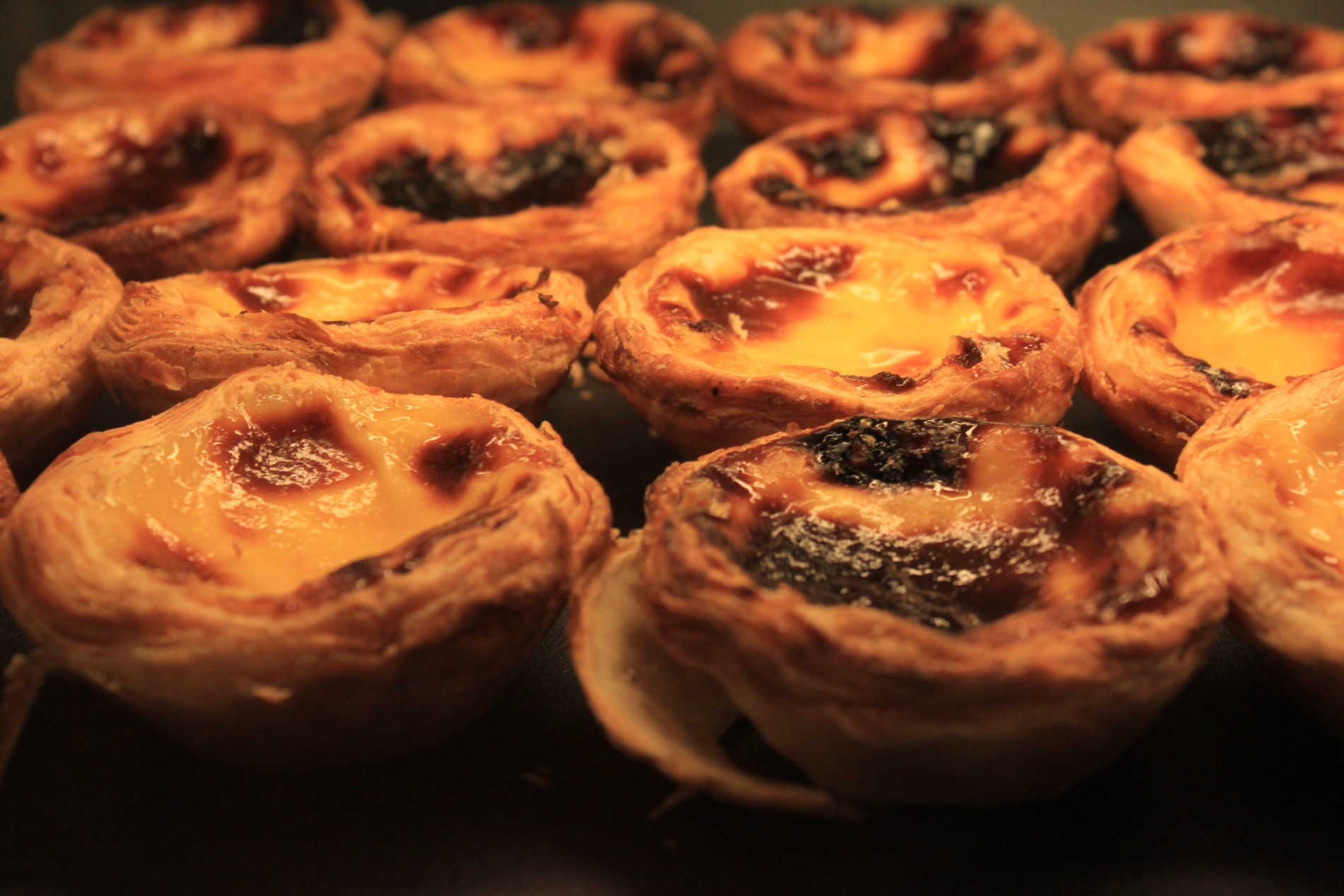
Pastéis de Belém, Portugal’s famous custard egg tart, sit on a rack waiting to be purchased.
“Where to now?” Brian asks me. We know that, at 3 PM, we need to show up for a scheduled tour of the Quinta do Vallado vineyard in the Duoro Valley, where vineyards grow grapes to make port wine. But, when we reach a roundabout leading to a web of highways, I still haven’t figured out at what other destinations we’ll stop on the way there. Brian is driving the car round and round the roundabout because he doesn’t know which direction to go yet.
“Which roundabout exit do I get off at?!” Brian asks, as cars whiz by us. We’ve been driving in circles for a few minutes. My view of the scenery outside the car windows is starting to blur.
“I don’t know! Maybe we should drive to this weird Baroque staircase? Or this college town called Coimbra?” I say, frazzled.
“I can’t leave the roundabout until you tell me where to go!” Brian keeps driving the car around the circle repeatedly, wanting to avoid heading off in the wrong direction.
“I don’t know where we’re going! Just stop!”
“We’re in a roundabout! I can’t stop! And we don’t have time!”
“I’m feeling sick! Just pick a direction!”
“Fine, but we’re going to be heading the wrong way!” Brian says, as he drives us onto a randomly-chosen highway. Soon, of course, I realize that we’re headed in exactly the wrong direction to visit Braga, the home of the Bom Jesus do Monte church and its famous Baroque staircase. I feel like I’m going to throw up, and everyone is feeling rushed by our 3 PM appointment. Nevertheless, we turn around, hurry up the beautiful staircase at the Bom Jesus do Monte (worth it!), and then begin driving toward the Duoro Valley, hoping to get a feel for it before we arrive at the vineyard.
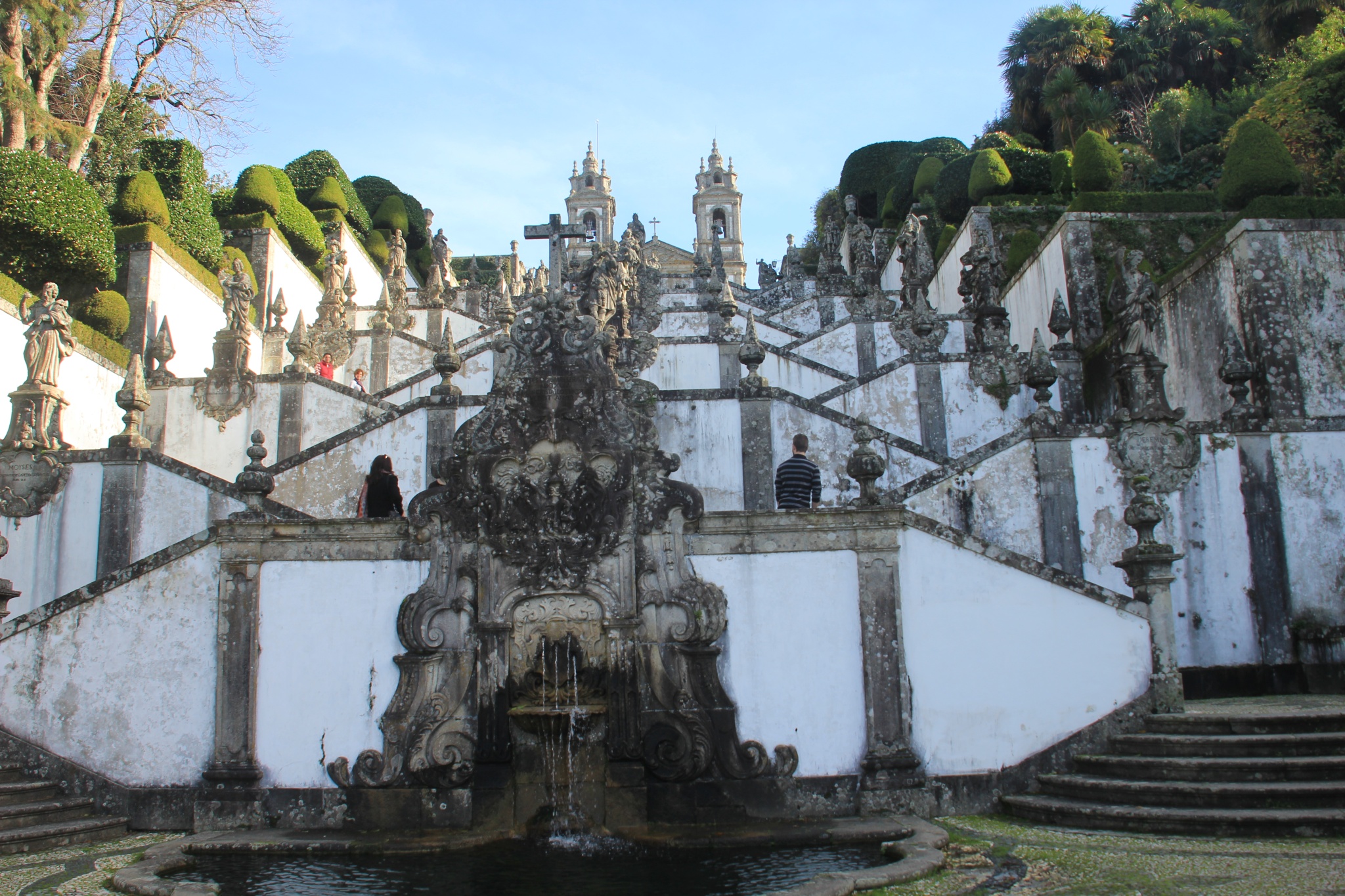
A beautiful, Baroque staircase can be climbed by visitors to the Bom Jesus do Monte church in Braga, Portugal.
Using my iPhone, I find a New York Times article about the Valley that suggests a drive through the countryside and includes vague directions from the village of Castedo: “…turn left at the fountain in the center of that village onto a narrow, bumpy road sloping sharply down.” I direct Brian toward Castedo, but the mountain that we’re on is so shrouded in fog that we feel like we’re flying at 30,000 feet, and we can’t tell a fountain from a cow.
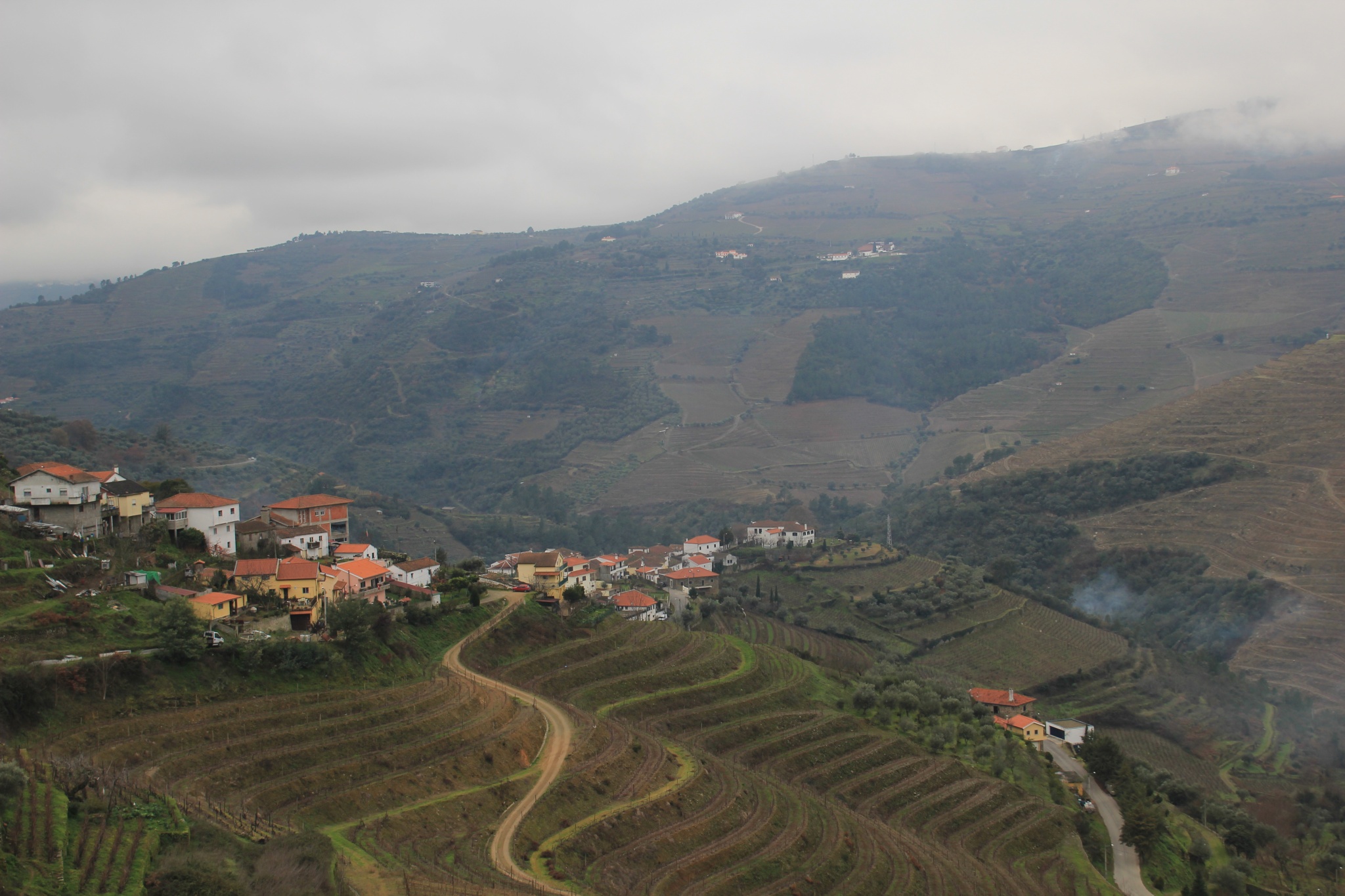
Expansive views greet visitors to Portugal’s Alto Duoro.
“Why are these directions so vague and dumb?” I wonder. Looking out the windows of the car, all we see is white.
“We’re not going to make it to the tour in time!” my mom reminds us from the backseat.
But, Brian and I are so enamored with the feeling of getting lost in the eerie Duoro fog that we continue navigating aimlessly on the network of steep roads skirting the peaks. Eventually, there’s a break in the fog, and we’re rewarding by an expansive view of the Alto Duoro: twisted rows of green vineyard grapes, curvy mountain roads, and the orange roofs of small ranch houses. As we continue down one of the precipitous, winding roads, I feel a shot of adrenaline, having no idea where it leads. It occurs to me that the New York Times writer cleverly engineered this serendipitous result, and I’m thankful.
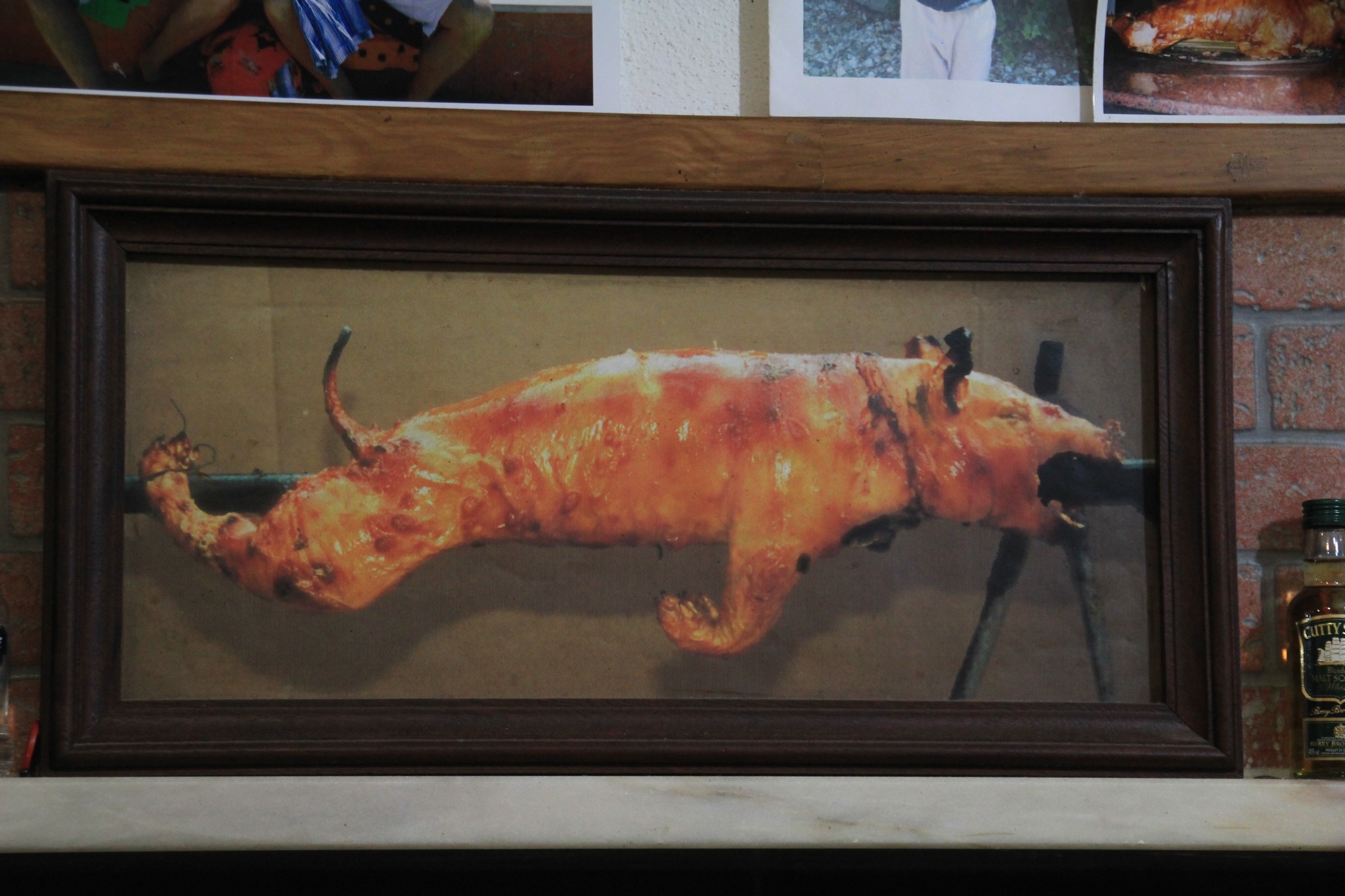
A photograph of a roasting pig sits above customers at the Porta Larga restaurant in Coimbra, Portugal.
When we arrive, finally, at the Quinta do Vallado, still in time for the vineyard tour, we meet an affable family from Arizona: a middle-aged, married couple with two college-aged daughters.
“How about those roads?!” says one of the daughters as we walk past rows and rows of wine barrels. “We were terrified! I never want to drive on those again.” It occurs to me that the Arizonians have missed the point of the Alto Duoro.
On the last day of our road trip, on our way back to Lisbon and without any specific appointments, we agree to take a detour to see Conimbriga, the best-preserved Roman ruins in Portugal. For lunch, we decide to stop at Porta Larga, a highly-touted roast pork sandwich shop in the adjacent college town of Coimbra.
We meander into the small restaurant, sit on the stools at the bar, and chat with Antonio, the restaurant’s owner. We order three pork sandwiches, and when he offers us a special dipping sauce, we accept. When the sandwiches arrive, we enjoy them slowly, smothering them in the salty topping and reveling in the strong flavor. We’re savoring every bite.
How to Take a Portugal Road Trip
OVERVIEW: Portugal is a small country in size, but it’s rich in culture, food, and wine — making it perfect for an enjoyable and manageable European road trip.
LOGISTICS: Fly the to Lisbon International Airport and rent a car. We rented from Europcar, but we got the best rate by using US rental car consolidator Auto Europe. If you use Auto Europe, however, make sure that the primary driver makes the reservation and that the primary driver’s credit card is used to pick up the car. It was a lot of trouble to make changes to the driver and credit card once we were in person at Europcar. We brought unlocked iPhone 5s to Portugal and purchased SIM cards from Vodafone Portugal at the Lisbon airport. For about €10, the Vita Total Smartphone plan provides a nano-SIM card pre-loaded with about 50 minutes of calls, 250 SMS, and 500 MB of data, all of which works anywhere in Portugal for 15 days.
ITINERARY: Our road trip focused on northern Portugal, though travelers with enough time may want to add the Algarve and Cape St. Vincent onto the end of their trip:
DAY 1 – 3: Lisbon is Portugal’s striking capital city. Be sure to see the Lisbon Cathedral, the Jerónimos Monastery, and eat a Pastéis de Belém at the Casa Pastéis de Belém. Go shopping in the Baixa, enjoy Fado in the Alfama, and grab a drink in the Bairro Alto. Hotel: The Palacio Belmonte is an exceptionally beautiful guest palace next to the Castle of São Jorge, and the breakfast is outstanding.
DAY 4: Sintra is a fairytale town filled with surreal palaces and dreamlike gardens; do not miss the Pena National Palace and Quinta da Regaleira. Hotel: See the Tivoli Palácio de Seteais‘s cream and gold interior design whether you decide to stay there or not.
DAY 5: Tomar, Alcobaça, and Óbidos: Tomar’s Castle and Convent of the Order of Christ is a UNESCO World Heritage Site and has a famous round church, the Monastery of Alcobaça is a gothic masterpiece with a cool kitchen, and Óbidos is a beautiful, well-preserved medieval town. Hotel: The Pousada de Óbidos is in a wing of a castle at the top of a hill above the town.
DAY 6: Porto is Portugal’s second largest city and is known for Portugal’s most famous international export, port wine. In Vila Nova de Gaia, tourists can see the wine “caves” where Port wine is stored and aged before being shipped around the world. We visited Taylor’s Port Wine, one of Porto’s oldest founding Port houses and the only remaining one that is family-owned. Hotel: On the banks of the Douro River, the Palácio do Freixo is a National Monument with modern furnishings.
DAY 7: The Duoro Valley is Portugal’s wine grape growing region. Hotel: Quinta Do Vallado is one of the oldest estates in the Douro Valley. The exceptionally comfortable, onsite Wine Hotel has an 18th-century, refurbished 5-room Mannor House and a newer, 8-room, modern hotel. The vineyard also offers tours of their operation, wine tastings, cooking classes, outdoor excursions, and excellent meals in the onsite restaurant.
DAY 8: Évora is a well-preserved medieval town and an UNESCO World Heritage Site. Hotel: The Pousada de Évora was originally a monastery, built in 1485.
DAY 9 – 11: The Algarve and Cape St. Vincent are two great destinations to visit in southern Portugal if enough time remains.
Things to Do in Lisbon
EXPERIENCE FADO: Fado is classical Portuguese guitar music, characterized by melancholy vocals and melodies. First, visit the Fado Museum in Lisbon’s Alfama neighborhood. Then, visit A Baiuca, a restaurant that serves up seafood and Fado. The music is much better than the food.
VISIT BELÉM AND EAT AN EGG TART: Belém is a neighborhood in Lisbon with a high concentration of monuments and sights, including the Monument to the Discoveries, Belém Tower, Jerónimos Monastery, Maritime Museum, Coach Museum, and Berardo Collection Museum. Drive there or take Bus 28 or the Train Cascais. When you’re done for the day, stop at Antiga Confeitaria de Belém, where Portugal’s famous egg tart pastry — invented by Catholic Monks in the Jerónimos Monastery — has been sold since 1837.
TAKE TRAM 28 THROUGH THE ALFAMA: Riding a public tram is a quintessential Lisbon experience, and Tram 28 is one of only three traditional trams still operating. Tram 28 takes riders up the steep hills of the Alfama, Lisbon’s oldest neighborhood. Along the way, you can stop and visit the Lisbon Cathedral, the Castle of São Jorge, the Fado Museum, cafes, and Fado restaurants.
VISIT THE BAIRRO ALTO AT NIGHT: The Bairro Alto is filled with traditional Portuguese restaurants and bars, great for those looking for nightlife.
Castles to See in Sintra, Portugal
OVERVIEW: Sintra is a fairytale town filled with surreal palaces and dreamlike gardens, and it’s only 30 minutes away from Lisbon. If you decide to stay the night, consider the beautiful Tivoli Palácio de Seteais. You’ll at least want to see the hotel’s cream and gold interior design.
PENA NATIONAL PALACE: Often enveloped in a clouds at the top of a mountain above Sintra, the Romanticist Pena National Palace sits in the middle of a 500-acre park, filled with trees from around the world and a labyrinth of walking trails. Yellow, medieval castle turrets and a large, stone triton (a half-man, half-fish statue) emerging from a clamshell transport visitors to another era.
QUINTA DA REGALEIRA: The most inspiring site in Sintra, this estate’s eccentric gardens feature beautiful fountains, lion and gargoyle statues, shadowed grottoes, and sprawling botanicals. The distinctive gothic palace looms above like a madman’s fantasy.
SINTRA NATIONAL PALACE: The best-preserved medieval royal palace in Portugal, the Sintra National Palace’s interior features a mixture of Gothic, Manueline, and Moorish styles, including a domed room decorated with 72 coats-of-arms of Portuguese noble families.
How to Visit Porto and the Duoro Valley
PORTO: Portugal’s second largest city is known for Portugal’s most famous international export, port wine. In Vila Nova de Gaia, tourists can see the wine “caves” where port wine is stored and aged before being shipped around the world. We visited Taylor’s Port Wine, one of Porto’s oldest founding Port houses and the only remaining one that is family-owned. In Porto, stay at the Palácio do Freixo, a Baroque-style palace and National Monument with modern furnishings.
THE DUORO VALLEY: This Valley is Portugal’s wine grape growing region. We stayed at Quinta Do Vallado, one of the oldest estates in the Douro Valley. The exceptionally comfortable, onsite Wine Hotel has an 18th-century, refurbished 5-room Mannor House and a newer, 8-room, modern hotel. The vineyard also offers tours of their operation, wine tastings, cooking classes, outdoor excursions, and excellent meals in the onsite restaurant.
LOGISTICS: Porto is a three hour drive north of Lisbon, and the Duoro Valley is a 90 minute drive east of Porto. It’s also possible to fly to Porto’s international airport from several major world cities.
Great choice to visit Porto! I live in this city and I'm always amazed with the new things I find here 🙂 Check out my blog about the city, maybe it can be helpful the next time you visit Porto!
It is usualy crazy to get pastéis de Belém, but your decision to head up north to Porto was great, I love that city. Your writting style is really cool by the way!
We're going to Christmas Eve in Sintra this year! Are the palaces in Sintra decorated for Christmas? Is there a good spot you recommend for Missa DE Gallo and Christmas Eve dinner?